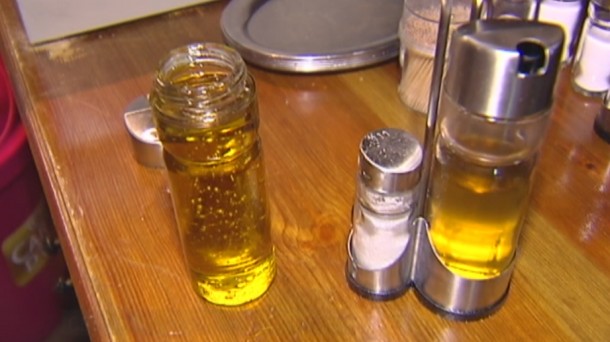Life
U-turn
EU Commission withdraws ban on olive oil jugs in restaurants
Reuters
Brussels
Last week, the Commission said restaurants would be banned from serving oil to diners in refillable glass jugs or dipping bowls from next year.
-
Restaurants were going to be banned from serving oil in refillable glass jugs
The European Commission has decided to tear up new rules on how restaurants should serve olive oil less than a week after unveiling them, following widespread ridicule and accusations of unwanted interference.
Last week, the Commission said restaurants would be banned from serving oil to diners in refillable glass jugs or dipping bowls from next year. Instead, to protect consumers from fraud, restaurants would have to use sealed, non-refillable bottles that must be disposed of when empty.
The rules were criticised by the leaders of France and the Netherlands at an EU summit on Wednesday. British Prime Minister David Cameron, who wants to claw back powers from Brussels ahead of a potential referendum on the country's EU membership in 2017, accused the Commission of unnecessary interference.
"This is exactly the sort of area that the European Union needs to get right out of, in my view," Cameron said. "It shouldn't even be on the table, to make a false pun."
Announcing the u-turn to journalists on Thursday, EU farm commissioner Dacian Ciolos said he had taken the decision once it became clear that consumers did not support the plans.
"This is crucial in my view, so I've decided to withdraw this proposal and not submit it for adoption," Ciolos said as he attempted to deflect a barrage of pointed questions.
"I wanted to come here today to demonstrate that I've been very alive to the current debate in the press."
Ciolos said he would propose revised rules to protect olive oil producers and consumers after further consultations with manufacturers, consumer groups and the restaurant industry, and promised to avoid any unnecessary red tape.
One of the first questions raised after the ban was presented was how on earth it was going to be policed, with critics wondering whether there would now be olive oil "police" circulating at night to check on restaurants.
But it was also questioned whether the ban was really about protecting consumers or more about supporting olive oil producers in southern Europe, with Greece, Spain, Italy and Portugal all suffering as a result of the economic crisis.
And while proponents said the proposed ban was about stopping fraud, experts pointed out that much of the fraud involving olive oil actually happens before it reaches restaurant tables, with producers blending inferior oil with higher quality product and labelling it "virgin olive oil".
top stories



-
news
New anti-eviction law
Andalucia begins proceedings to seize confiscated houses from banks
-
news
London attack
British police ponder conspiracy after soldier murder
-
Sport
Giro d'Italia
Nibali tightens grip on overall lead after stage victory
-
Sport
Spanish soccer league
Real Sociedad, Valencia resume duel for last Champions League ticket
-
Sport
Giro d'Italia
Nibali tightens grip on overall lead after stage victory
© EITB - 2025 - Privacy Policy - Legal disclaimer - Cookie Policy - Cookie settings


